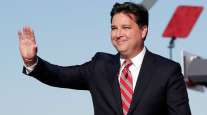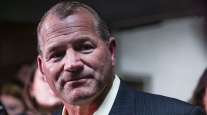Freight Industry Leaders Unite to Push for More Road Funding
This story appears in the May 19 print edition of Transport Topics.
WASHINGTON — Leaders from nearly all segments of the freight-hauling industry and other transportation and business groups convening here for “Infrastructure Week” called for long-term federal aid they said would help states and businesses plan projects that improve the way goods move around the country — and the globe.
American Trucking Associations and the U.S. Chamber of Commerce were among the groups that said raising federal fuel taxes would be a viable approach to increasing transportation dollars for the depleted Highway Trust Fund account that helps states pay for certain major construction projects.
Others stressed that a restructuring of corporate tax rates and other financial setups also could be useful in shoring up the highway account.
The Department of Transportation estimates the Highway Trust Fund will run out of money by August, primarily because the national tax on fuel is no longer enough to sustain it.
The current federal diesel tax is 24.4 cents a gallon, and the tax for gasoline is 18.4 cents.
A May 13 event featured trucking, railroad, port and intermodal leaders who said they were putting aside policy differences to emphasize the importance of boosting federal highway funding. Three senators who are involved in the reauthorization of transportation programs also spoke at the event at ATA’s Capitol Hill office.
Despite a Senate committee’s effort to advance long-term legislation that would restore the trust fund and authorize other programs in the 2012 highway law MAP-21, ATA President Bill Graves predicted Congress would pass a short-term legislative fix this summer. That would keep the fund solvent until agreement is reached on a long-term reauthorization of MAP-21.
“I believe the money they have to find to shore up the Highway Trust Fund will actually be a teachable moment, because it’s a small sliver of what’s going to have to be found to do the whole bill, and I think that will awaken a few people to some of the realities,” Graves said.
He participated on a panel with Kurt Nagle, president of the American Associations of Port Authorities, and Ed Hamberger, president of the Association of American Railroads. They agreed Congress most likely will pass a short-term extension this summer and consider a fuller bill next year. The panel was moderated by Joni Casey, CEO of the Intermodal Association of North America.
“Interconnectivity is certainly one of our priorities,” Nagle said.
Graves also moderated a panel of trucking leaders that included ATA Chairman Philip Byrd Sr., the CEO of Bulldog Hiway Express; Pat Thomas, second vice chairman of ATA and vice president of UPS Inc.; and Bill Logue, president of the FedEx Freight division of FedEx Corp.
Logue stressed that a way to galvanize broad public support for infrastructure spending is to “change the debate from potholes” and emphasize the economic benefits of a modern transportation system.
Graves also suggested it appeared unlikely there would be changes to existing federal truck size-and-weight regulations, something many in the industry have been seeking.
In a statement, Sean McNally, ATA’s vice president of communications, told Transport Topics: “At this point in the reauthorization process, other priorities like finding sufficient funding will take precedence, but we will continue to look for ways to advance the issue.”
Also at the ATA event, Sen. Tom Carper (D-Del.) indicated that raising the national fuel tax would help pay for large-scale projects.
In addition, Sen. Richard Blumenthal (D-Conn.) pledged his support for improved safety on the roads and railroads, and Sen. Roy Blunt (R-Mo.) touted his bill that would establish a $50 billion infrastructure fund financed with multinational companies’ repatriated foreign profits.
“Infrastructure is something everybody knows we need to do a better job maintaining; almost nobody wants to pay for it,” Blunt said.
The bill is co-sponsored by Sen. Michael Bennet (D-Colo.), and it has yet to be considered in committee. On the House side, Rep. John Delaney (D-Md.) has offered similar legislation.
On May 12, Tom Donohue, the head of the Chamber of Commerce, repeated his call for a federal fuel tax increase as part of a five-point plan that would augment the transportation system.
“What everyone would agree to is that we need a comprehensive
forward-looking program that meets the needs of a competitive 21st century,” Donohue said during a kickoff event.
Transportation Secretary Anthony Foxx appeared at a separate event, where he lauded the Obama administration’s four-year, $302 billion highway proposal that reforms certain corporate taxes as a way to bolster the trust fund — reforms that would generate about $150 billion in revenue.
“The moment is dire,” Foxx said. “We’re about to be at a point where our obligations are going to exceed our ability to pay those responsibilities out.”
Atlanta Mayor Kasim Reed, former Mississippi Gov. Haley Barbour and Matt Rose, BNSF Railway executive chairman, joined Foxx in urging Congress to boost the fund.
Similar calls came from the leadership at the American Society of Civil Engineers, the American Public Transportation Association and the Transportation for America nonprofit.




